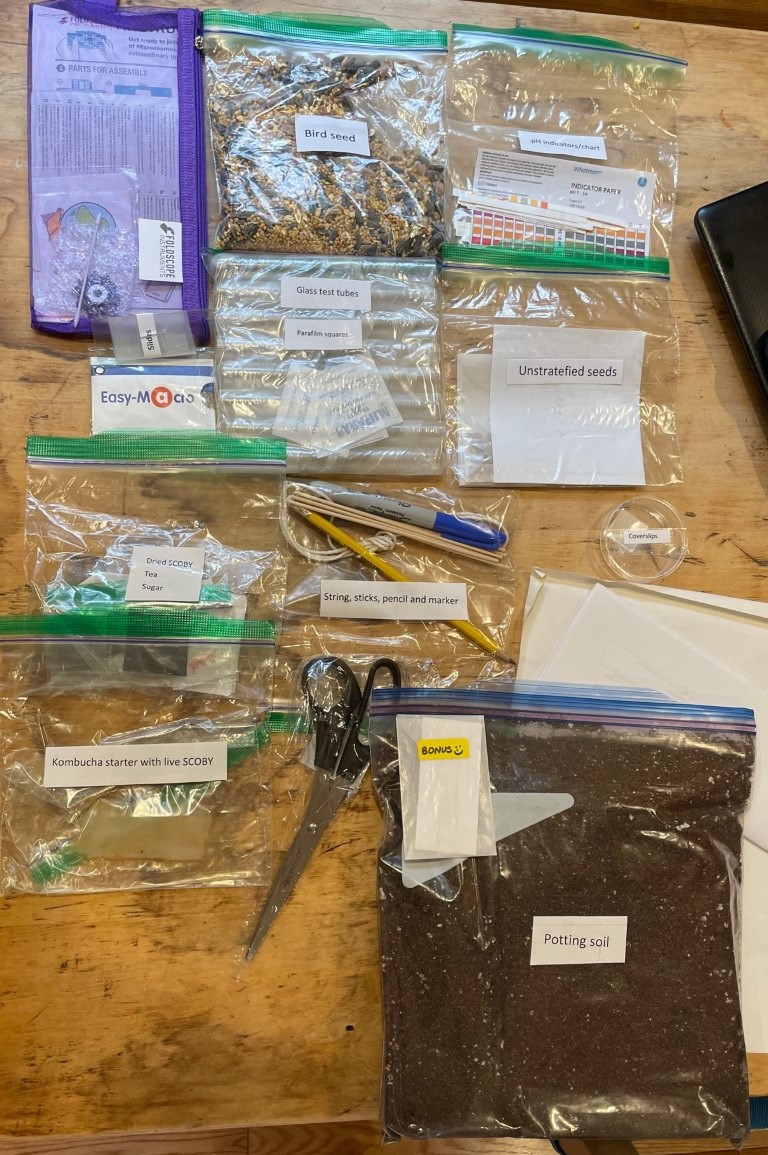How CBS kept students engaged in science through the pandemic
With the sudden onset of COVID-19 shutdowns in 2020, U of G faculty and students were forced to quickly transition to online courses.

The course field kits allowed students to become scientists in their own living rooms
The Department of Integrative Biology at the University of Guelph was ahead of the game. Virtual field courses were developed in 2018 when students started exploring ways to make field experiences more accessible. For example, as an alternative to a twelve-day field course to Algonquin Park, an idea emerged to explore local field courses that promoted accessibility and eliminated costs associated with travel.
The concept was fast-tracked when the pandemic hit, and a program to mail field kits and deliver courses through Zoom was introduced in 2021.
Two virtual courses in Field Ecology were made available to students. One focuses on biodiversity and ecological interactions in terrestrial settings, and the other focuses on biodiversity and watershed management.
Shoshanah Jacobs is an Associate Professor with the Department of Integrative Biology and co-designer of one of the virtual courses. "The kits were critical," Shoshanah says. "We could have just run the virtual course, but the kits brought a little bit of our physical classroom to the students. It allowed students to become scientists in their living rooms."
"These kits allowed students, particularly fourth and final-year students, to engage in the high-quality experiential learning that we know is important for their success," adds Shoshanah.
Depending on the course, each kit costs about $22 and contains several items that enable students to conduct their research at home. Kits included several 'low-tech' pieces such as a Fold Scope – a cardboard folding microscope that can be sent around the world and doesn't require electricity. Other items included elastic bands with a lens that worked with cellphones and turned them into microscopes, as well as native plants, soils and seeds, and ingredients to make homemade kombucha.
David Stephenson of Natural Resource Solutions Inc. (NRSI) became aware of the field courses through a newsletter he received. Information about the course encouraged him to lend support to the program so that the kits could be provided to students at no cost. David is a UofG alumnus, as are many of his staff. Both David and NRSI are longstanding supporters of the University of Guelph.
NRSI is an environmental consulting company headquartered in Waterloo. Sponsorship of the field courses was in line with past projects that they have supported at Guelph, all of which have been related to field biology.
"Sponsorship of the kits was consistent with our theme and was something that would be helpful during the pandemic. The kits encouraged hands-on experience, which is important to us and something that we want to support," David said.
The company's relationship with the University of Guelph has included many collaborations such as support for student interns, collaborative research, co-op placements, participation in career nights, involvement in the mentorship program, and support for multiple scholarships.
Emma Mossington is a student who participated in the six-week virtual field course led by Shoshanah Jacobs in 2021. "By participating with students in a range of geographic locations, the kits broadened the scope of the information you had access to and the analysis of different regions. This diversity would not have been something we would have been able to get if we were all in the same place," says Emma. "As part of the process, there was so much discussion and sharing, and learning about the different areas that people were from."
"The kits provided a great deal of freedom and choice in terms of the path you wanted to follow and how experimental you wanted to be," she continues. "It allowed me to make decisions and make mistakes and learn from them."
Amanda Ball is a biological science student who also took the virtual course that focuses on biodiversity and watershed management with Dr. Jacobs. "The opportunity to do science and research from the spare bedroom of my home was very cool and demonstrated to me how accessible science can be for everyone," she said.
While traditional field courses remain excellent, virtual courses are a great example of innovation in teaching at the University of Guelph and an option that proved to be very popular and a much more accessible alternative for students.
Share With Friends




